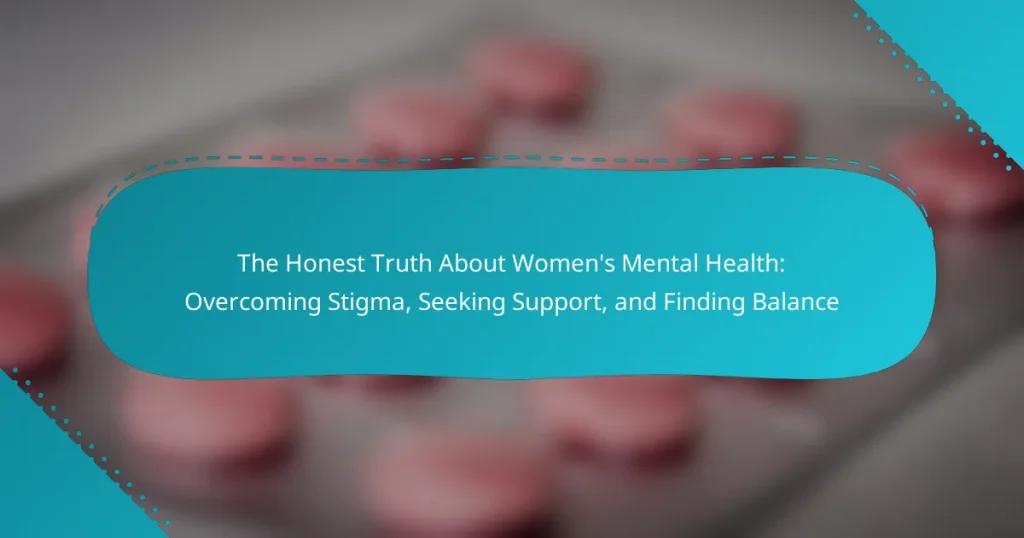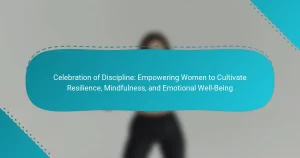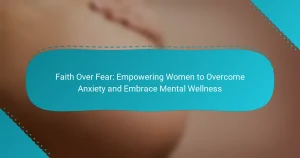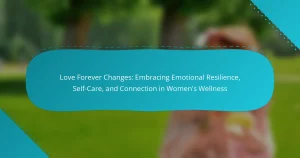Women’s mental health often faces stigma, making it challenging to seek support and achieve balance. Unique factors like hormonal changes and societal pressures contribute to issues such as anxiety and depression. Understanding these challenges is crucial for overcoming stigma and accessing therapy, support groups, and community resources. Engaging in self-care practices and exploring innovative techniques can further enhance mental wellness for women.

What are the common mental health challenges faced by women?
Women commonly face mental health challenges such as anxiety, depression, and eating disorders. These issues often stem from societal pressures, trauma, and hormonal changes. Research indicates that women are twice as likely as men to experience anxiety disorders. Additionally, postpartum depression affects approximately 15% of new mothers, highlighting the unique challenges women encounter during and after pregnancy. Seeking support through therapy and community resources is crucial for overcoming these mental health hurdles.
How do hormonal changes affect women’s mental health?
Hormonal changes significantly impact women’s mental health, influencing mood, anxiety, and overall emotional well-being. Fluctuations in hormones, particularly during menstruation, pregnancy, and menopause, can lead to symptoms such as depression and anxiety. For instance, studies indicate that about 50% of women experience mood changes related to their menstrual cycle. These hormonal shifts can disrupt neurotransmitter balance, affecting mood regulation. As a result, women may benefit from understanding these changes and seeking appropriate support to manage their mental health effectively.
What role does societal pressure play in women’s mental well-being?
Societal pressure significantly impacts women’s mental well-being by fostering unrealistic expectations. This pressure can lead to anxiety, depression, and low self-esteem. Studies show that women often feel compelled to conform to societal norms regarding appearance, career success, and family roles, which can exacerbate mental health issues. For instance, research indicates that 60% of women report feeling stressed by societal expectations, highlighting the need for support systems and awareness to combat stigma. Addressing these pressures through open conversations can promote healthier mental states and empower women to seek help.
How does trauma impact women’s mental health?
Trauma significantly affects women’s mental health, often leading to anxiety, depression, and PTSD. Women exposed to trauma may experience unique challenges, including societal stigma and caregiving roles. Studies indicate that approximately 1 in 3 women will experience trauma in their lifetime, impacting their emotional well-being and relationships. Seeking support through therapy and community resources is crucial for recovery and resilience.
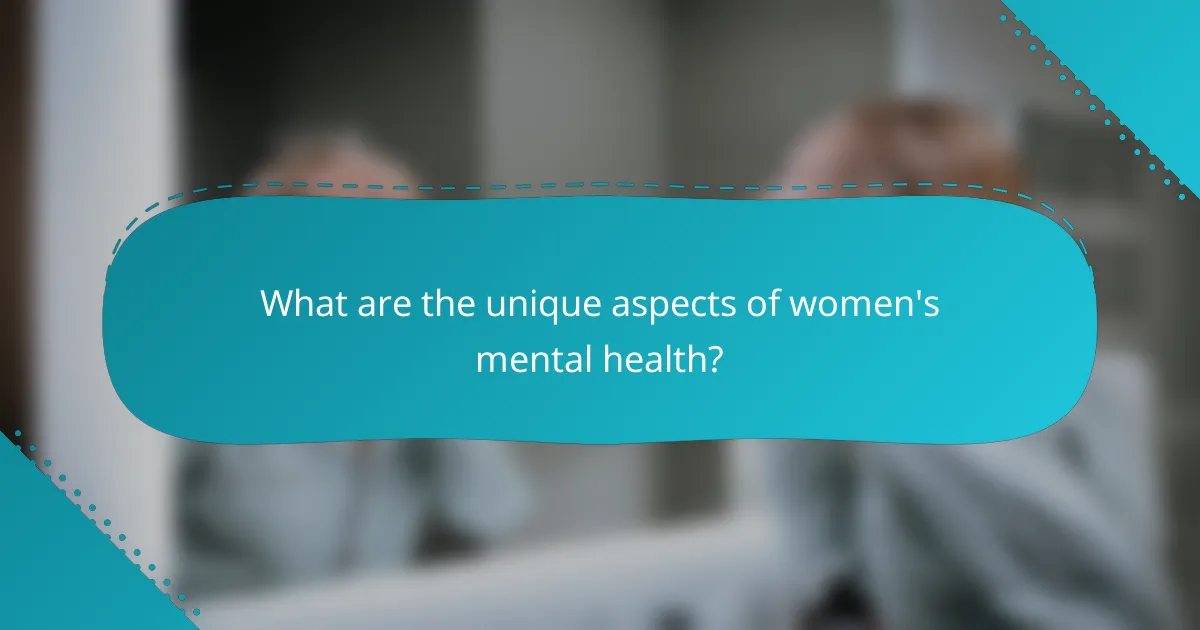
What are the unique aspects of women’s mental health?
Women’s mental health is uniquely influenced by biological, psychological, and social factors. Key aspects include hormonal fluctuations, societal expectations, and the prevalence of trauma. Hormonal changes, particularly during menstruation, pregnancy, and menopause, can significantly impact mood and mental well-being. Additionally, women often face societal pressures that contribute to anxiety and depression. Studies show that women are more likely to experience post-traumatic stress disorder (PTSD) due to higher rates of trauma exposure. Seeking support is crucial for managing these challenges and promoting mental health balance.
How do cultural factors influence women’s mental health perceptions?
Cultural factors significantly shape women’s mental health perceptions by influencing attitudes toward mental illness and help-seeking behaviors. Societal norms often dictate how women express emotional distress and seek support. For instance, cultures that stigmatize mental health issues may discourage women from discussing their struggles, leading to isolation. Conversely, cultures that promote open dialogue can empower women to seek help, enhancing their mental well-being. Additionally, unique attributes such as family roles and community expectations can further impact how women perceive and address their mental health needs. Understanding these cultural influences is crucial for developing effective support systems.
What are the unique stressors women face in the workplace?
Women face unique stressors in the workplace, including gender bias, work-life balance challenges, and mental health stigma. These stressors can lead to increased anxiety and burnout. For example, women often encounter unequal pay and limited advancement opportunities, exacerbating feelings of inadequacy. Additionally, societal expectations regarding caregiving can create conflicts between professional and personal responsibilities. Addressing these issues is crucial for fostering a supportive work environment that promotes mental health and well-being.
How does motherhood impact mental health?
Motherhood can significantly impact mental health, often leading to anxiety and depression. Hormonal changes, sleep deprivation, and the pressure of caregiving contribute to these challenges. Research indicates that approximately 15% of mothers experience postpartum depression, highlighting the need for support. Seeking help through therapy or support groups can foster resilience and improve overall well-being.
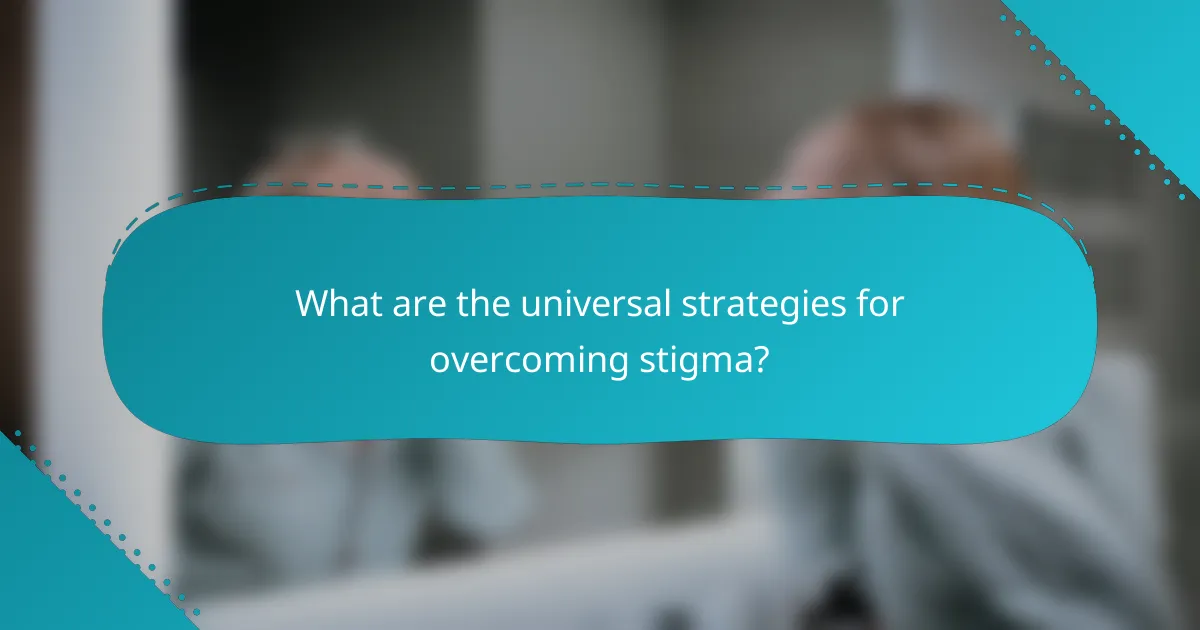
What are the universal strategies for overcoming stigma?
To overcome stigma, individuals can adopt strategies such as education, open dialogue, and community support. Education about mental health reduces misconceptions and fosters understanding. Open dialogue encourages sharing experiences, promoting empathy. Community support networks provide safe spaces for individuals to connect and seek help. These strategies empower individuals and create a more supportive environment.
How can education reduce stigma around women’s mental health?
Education can significantly reduce stigma around women’s mental health by promoting awareness and understanding. Comprehensive programs can challenge misconceptions, providing accurate information about mental health conditions. As a result, women may feel more empowered to seek support without fear of judgment.
Research indicates that educational initiatives can lead to a 30% decrease in stigma-related attitudes in communities. Workshops and discussions foster open dialogue, allowing women to share experiences and learn from one another.
Additionally, integrating mental health education into school curriculums encourages early recognition of issues, creating a culture of support. This proactive approach helps normalize conversations about mental health, ultimately contributing to a more supportive environment for women.
What role do support networks play in overcoming stigma?
Support networks play a crucial role in overcoming stigma related to women’s mental health. They provide emotional support, foster understanding, and encourage open dialogue. By connecting individuals facing similar challenges, these networks help normalize experiences and reduce feelings of isolation. Research shows that women who engage with support networks report improved mental well-being and resilience. Access to these networks can significantly diminish the stigma associated with seeking help, empowering women to prioritize their mental health without fear of judgment.
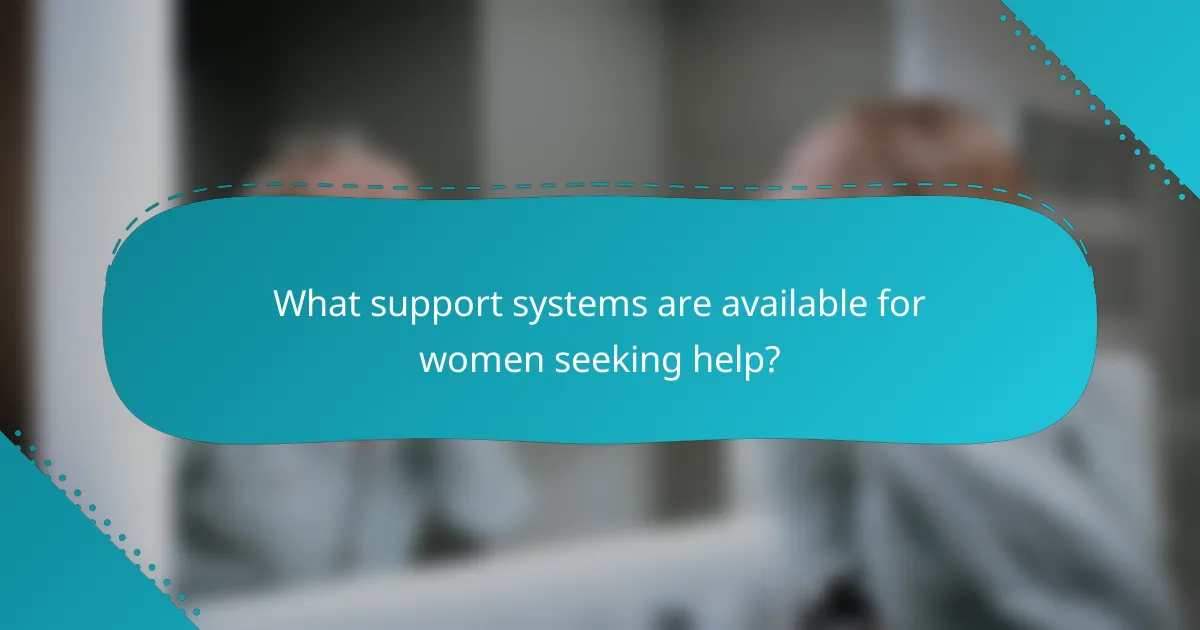
What support systems are available for women seeking help?
Women seeking help can access various support systems, including therapy, support groups, and online resources. These systems provide emotional, social, and practical assistance tailored to women’s mental health needs.
Therapy options include individual counseling and group therapy, focusing on issues like anxiety, depression, and trauma. Support groups offer a community where women can share experiences and coping strategies, fostering a sense of belonging. Online resources, such as mental health apps and websites, provide information and tools for self-help and mindfulness practices.
Additionally, community organizations and hotlines offer immediate support and guidance, ensuring women have access to the help they need. These systems work together to combat stigma and promote mental wellness, empowering women to seek the assistance they deserve.
How can therapy and counseling benefit women’s mental health?
Therapy and counseling significantly enhance women’s mental health by providing support, tools, and coping strategies. These services help reduce stigma, promote emotional well-being, and empower women to navigate life’s challenges.
Therapy offers a safe space for women to express feelings and experiences, fostering self-awareness and personal growth. Studies show that women who engage in therapy report improved mood, reduced anxiety, and better stress management.
Counseling can address unique challenges faced by women, such as balancing work and family or coping with societal pressures. Accessing these resources encourages women to prioritize their mental health, leading to healthier relationships and improved overall quality of life.
Ultimately, therapy and counseling serve as vital components in overcoming mental health stigma and achieving emotional balance for women.
What are the advantages of support groups for women?
Support groups for women provide emotional support, foster a sense of community, and offer shared experiences. These groups help reduce feelings of isolation, promote understanding, and encourage open discussions about mental health challenges. As a result, members often report improved coping strategies and increased resilience. Support groups empower women by validating their experiences and providing practical resources for mental well-being.
How can online resources provide support for mental health?
Online resources significantly support mental health by providing accessible information, community engagement, and professional guidance. These platforms help women combat stigma by fostering open discussions about mental health challenges. For instance, online forums and social media groups allow women to share experiences, reducing feelings of isolation. Additionally, teletherapy services offer convenient access to mental health professionals, making support more attainable. Research indicates that 75% of individuals using online resources report improved mental well-being. Overall, these resources empower women to seek help and find balance in their lives.
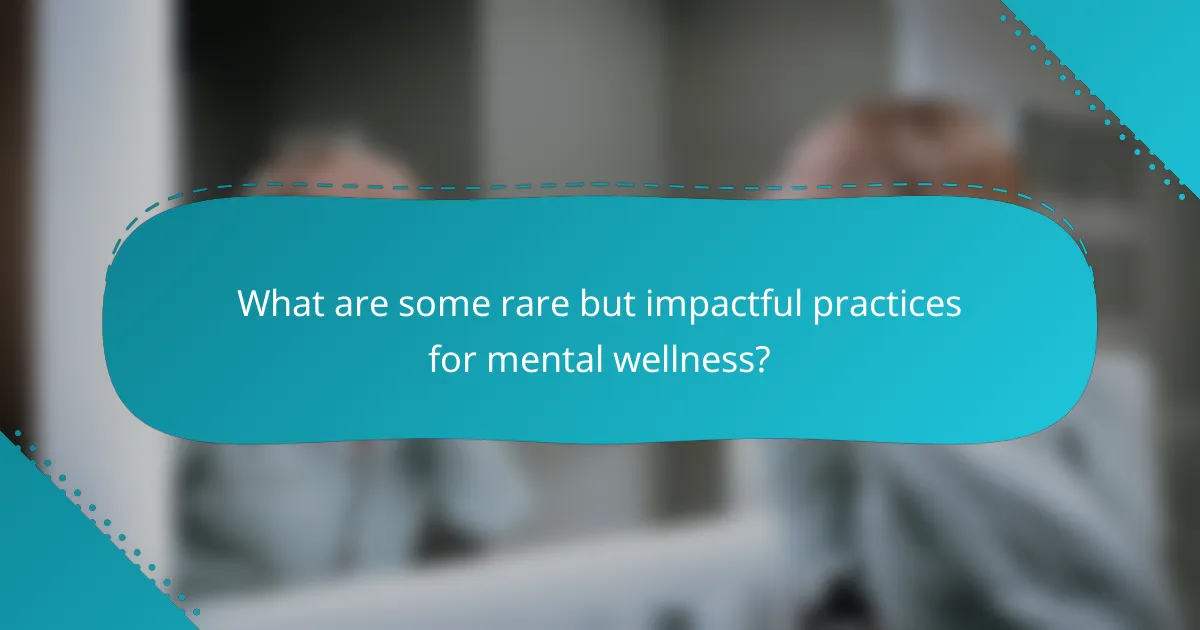
What are some rare but impactful practices for mental wellness?
Engaging in rare but impactful practices can significantly enhance women’s mental wellness. Techniques like forest bathing, which involves immersing oneself in nature, have shown to reduce stress and improve mood. Another unique approach is art therapy, allowing self-expression through creativity, fostering emotional healing. Mindfulness-based stress reduction, a less common practice, focuses on awareness and acceptance, promoting mental clarity. Lastly, sound healing, using specific frequencies to promote relaxation, has gained attention for its therapeutic benefits. These practices can help women overcome stigma, seek support, and find balance in their mental health journey.
How can creative expression aid in mental health recovery?
Creative expression significantly aids mental health recovery by providing an outlet for emotions and fostering self-discovery. Engaging in activities like art, music, or writing allows individuals to process feelings and experiences. Research shows that creative activities can reduce anxiety and depression symptoms, enhancing overall well-being. Additionally, creative expression promotes social connections, which are vital for support and healing. Incorporating creative practices into recovery plans can lead to improved emotional resilience and a greater sense of purpose.
What role does nutrition play in women’s mental wellness?
Nutrition significantly influences women’s mental wellness by impacting mood, cognitive function, and overall mental health. A balanced diet rich in essential nutrients can reduce symptoms of anxiety and depression. For instance, omega-3 fatty acids, found in fish, are linked to improved mood regulation. Additionally, vitamins such as B12 and D play crucial roles in brain health. A study highlighted that women consuming adequate amounts of fruits and vegetables reported lower levels of stress. Therefore, prioritizing nutrition is vital for enhancing mental wellness in women.
How can physical activity enhance mental well-being?
Physical activity significantly enhances mental well-being by reducing anxiety, depression, and stress. Engaging in regular exercise releases endorphins, which are natural mood lifters. Studies show that women who participate in physical activities report improved self-esteem and cognitive function. Additionally, group exercises foster social connections, crucial for combating stigma around mental health. Incorporating physical activity into daily routines can lead to a balanced lifestyle and greater emotional resilience.
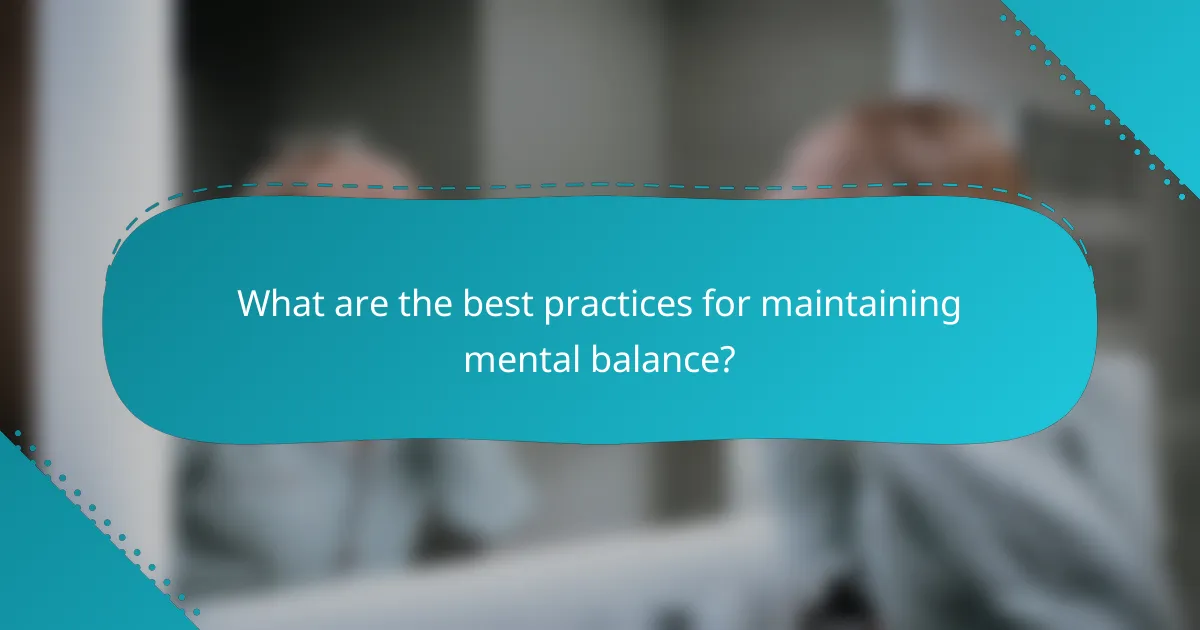
What are the best practices for maintaining mental balance?
To maintain mental balance, prioritize self-care, establish a support network, and practice mindfulness. Regular physical activity enhances mood and reduces stress. Engage in hobbies to foster creativity and relaxation. Limit exposure to negative influences, including social media. Seek professional help when needed to address underlying issues.
How can mindfulness techniques improve mental health?
Mindfulness techniques significantly enhance mental health by reducing stress and anxiety. These practices promote emotional regulation and self-awareness, leading to improved overall well-being. Research indicates that mindfulness can decrease symptoms of depression and increase resilience. Regular mindfulness practice fosters a balanced mental state, empowering women to navigate challenges and stigma surrounding mental health.
What are the common mistakes women make in prioritizing mental health?
Women often neglect their mental health by prioritizing others’ needs, avoiding professional help, and underestimating stress. These common mistakes stem from societal expectations and stigma. For example, many women feel guilty for taking time for self-care, leading to burnout. As a result, they may overlook signs of anxiety or depression, delaying necessary treatment. Acknowledging these patterns can empower women to seek support and prioritize their mental well-being.
How can women create a personalized mental wellness plan?
Women can create a personalized mental wellness plan by identifying specific needs, setting achievable goals, and incorporating supportive practices. Begin by assessing emotional triggers and stressors, which helps in understanding personal mental health challenges. Next, establish clear and realistic objectives, such as practicing mindfulness or engaging in regular physical activity. Include various forms of support, such as therapy, community programs, or self-help resources. Regularly review and adjust the plan to ensure it remains effective and aligned with evolving mental health needs.
What expert insights can help women navigate mental health challenges?
Expert insights emphasize the importance of open conversations, self-care strategies, and professional support for women facing mental health challenges. Women should prioritize their mental well-being by seeking therapy, joining support groups, and practicing mindfulness. Research indicates that women are more likely to experience anxiety and depression, making it crucial to address these issues proactively. Establishing a balanced routine that includes physical activity, social engagement, and relaxation techniques significantly enhances mental health outcomes.
